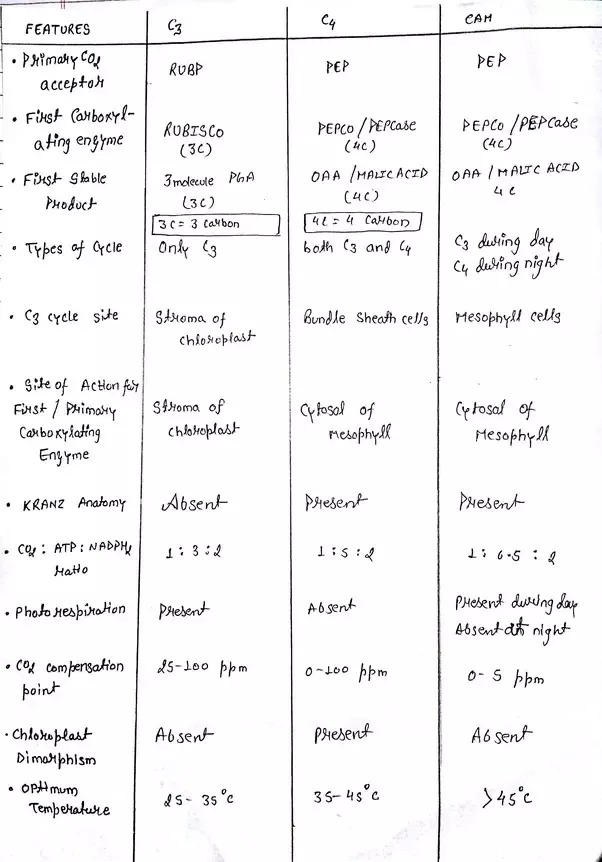C3 Plants Example
They can be annual perennial. Ardipithecus ramidus and Ar anamensis were both reliant on C3 plants but when a climate change altered eastern Africa from wooded regions to savannah about four million years ago the species that survivedAustralopithecus afarensis and Kenyanthropus platyopswere mixed C3C4 consumers.

Types Of Photosynthesis In Plants C3 C4 And Cam Youtube Source: www.youtube.com
The first stable product formed in C3 cycle is a three carbon 3C compound hence the name.

C3 plants example. Most lawn grasses such as rye and fescue are C3 plants. The first step of the Calvin cycle is the fixation of carbon dioxide by rubisco and plants that use only this standard mechanism of carbon fixation are called plants for the three-carbon compound 3-PGA the reaction produces. Some good example of C3 plants include.
16 rows Examples of C3 plants include sunflower beans wheat oats rice cotton chlorella spinach. Ground nut Arachis hypogaea 3. C3 plants are highly rich in proteins.
During summer C3 plants are less productive due to the high temperature and less soil moisture. Cowpea cassava soybean and rice. Majority of the plants 95 on earth are C3 type.
C3 cycle is the first described dark reaction pathway. C3 plants are those where the first product of photosynthesis is a 3 carbon compound ie. They include the cereal grains.
C 3 plants cannot grow in very hot areas because RuBisCO incorporates more oxygen into RuBP as temperatures increase. Wheat mustard carrot barley cabbage etc are C3 plants. There are roughly 8100 known C 4 species which belong to at least 61 distinct evolutionary lineages in 19 families as per APG IV.
A cross section of the leaf of Arabidopsis thaliana which is a C3 plant is shown in figure 1. China rose Hibiscus rosa-sinensis 2. Advanced Remote Sensing 2012.
About of the plant species on the planet are. Examples of the three types. C3 plants are plants in which the initial product of the assimilation of carbon dioxide through photosynthesis is 3-phosphoglycerate which contains 3 carbon atoms.
The C 3 plants originating during Mesozoic and Paleozoic eras predate the C 4 plants and still represent approximately 95 of Earths plant biomass including important food crops such as rice wheat soybeans and barley. Some of the C3 plant examples are wheat rye oats orchard grass. The regions where these crops are grown in are often hot and dry meaning they could benefit from the energy-saving mechanisms of C4 photosynthesis.
C3 plants include the cereals barley oats rice and wheat alfalfa lucerne cotton Eucalyptus sunflower soybeans sugar beets potatoes tobacco Chlorella and others. Cactus euphorbia some orchids epiphytic short of water not too hot. C3 plants include some of the most important sources of calories all over the world.
However the C4 anatomical and biochemical adaptations require additional plant energy and resources than C3 photosynthesis and so in cooler environments C3 plants are typically more photosynthetically efficient and productive. Corn beans region of overlap C3. C 4 plants use the C 4 carbon fixation pathway to increase their photosynthetic efficiency by reducing or suppressing photorespiration which mainly occurs under low atmospheric CO 2 concentration high light high temperature drought and salinity.
16 rows Wheat oats rye orchardgrass are some of the examples of C3 plants. CAM plants have C4 reactions at night C3 in day. These plants carry out.
Plants which uses C3 cycle Calvin cycle of dark reaction of photosynthesis. Mostly grasses but some shrubs cold-tolerant CAM. Wheat rice barley oats.
Examples of C4 plants include corn sorghum sugarcane millet and switchgrass. Peanuts cotton sugar beets tobacco spinach soybeans and most trees are C3 plants. Calvin cycle helps plants to store energy for a more extended period.
Beans rice wheat potatoes. C3 plants have the disadvantage that in hot dry conditions their photosynthetic efficiency suffers because of a process called photorespiration. C3 plants can be either annual plants like wheat oats and rye or perennial plants like fescues and orchard.
Encyclopedia of Agriculture and Food Systems 2014.

Bundle Sheath Cell An Overview Sciencedirect Topics Source: www.sciencedirect.com

The Difference Between C3 And C4 Plants Ripe Source: ripe.illinois.edu

How Would You Compare And Contrast C3 C4 And Cam Plants Quora Source: www.quora.com

Photosynthesis Cellular Energy Ppt Download Source: slideplayer.com

C3 Plants C4 Plants Cam Plants Heterotrophic Plants Ppt Video Online Download Source: slideplayer.com

Photosynthesis C3 C4 Cam Plants Ppt Video Online Download Source: slideplayer.com
